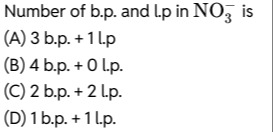Question
Question: Number of b.p. and l.p in $NO_3^-$ is...
Number of b.p. and l.p in NO3− is

A
3 b.p. + 1 l.p
B
4 b.p. + 0 l.p.
C
2 b.p. + 2 l.p.
D
1 b.p. + 1 l.p.
Answer
4 b.p. + 0 l.p.
Explanation
Solution
To determine the number of bond pairs (b.p.) and lone pairs (l.p.) in the nitrate ion (NO3−), we follow these steps:
-
Calculate the total number of valence electrons:
- Nitrogen (N) is in Group 15, so it has 5 valence electrons.
- Oxygen (O) is in Group 16, so it has 6 valence electrons.
- The ion has a -1 charge, which means there is an additional electron.
- Total valence electrons = 5 (for N) + 3 × 6 (for 3 O atoms) + 1 (for the -1 charge) = 5 + 18 + 1 = 24 valence electrons.
-
Draw the Lewis structure:
- Nitrogen is the central atom as it is less electronegative than oxygen.
- Form single bonds between the central nitrogen atom and the three oxygen atoms. This uses 3 × 2 = 6 electrons.
- Remaining electrons = 24 - 6 = 18 electrons.
- Distribute the remaining 18 electrons as lone pairs on the terminal oxygen atoms to complete their octets. Each oxygen needs 6 electrons (3 lone pairs). So, 3 × 6 = 18 electrons are used. All electrons are now distributed.
- Check the octet of the central nitrogen atom. Currently, nitrogen has 3 single bonds, meaning 3 × 2 = 6 electrons. Its octet is not complete.
- To complete nitrogen's octet, one lone pair from a terminal oxygen atom must be converted into a double bond between that oxygen and nitrogen.
- The resulting Lewis structure (one of its resonance forms) will have one N=O double bond and two N-O single bonds. Nitrogen will have no lone pairs. Each oxygen atom will have an octet (the double-bonded oxygen will have 2 lone pairs, and the two single-bonded oxygens will each have 3 lone pairs).
-
Count bond pairs (b.p.) and lone pairs (l.p.) on the central atom (Nitrogen):
- The question asks for the number of b.p. and l.p. in NO3−. In the context of options provided, "bond pairs" refers to the total shared electron pairs around the central atom, including both sigma and pi bonds.
- Nitrogen forms one double bond (N=O) and two single bonds (N-O).
- A double bond consists of two shared electron pairs (one sigma and one pi). So, the N=O double bond contributes 2 bond pairs.
- Each single bond consists of one shared electron pair (one sigma). So, the two N-O single bonds contribute 1 + 1 = 2 bond pairs.
- Total bond pairs around the central nitrogen atom = 2 (from double bond) + 1 (from first single bond) + 1 (from second single bond) = 4 bond pairs.
- Looking at the Lewis structure, the central nitrogen atom has no lone pairs. So, lone pairs on nitrogen = 0.
Therefore, the number of b.p. and l.p. in NO3− is 4 b.p. + 0 l.p.
